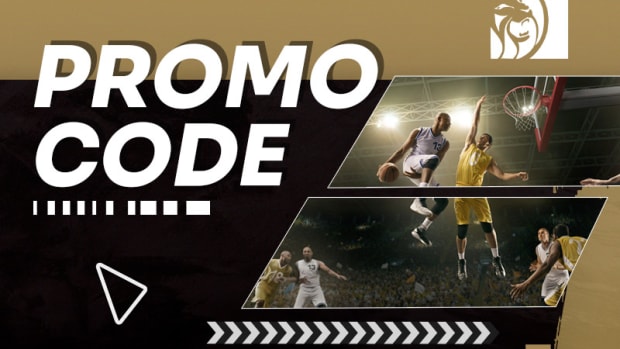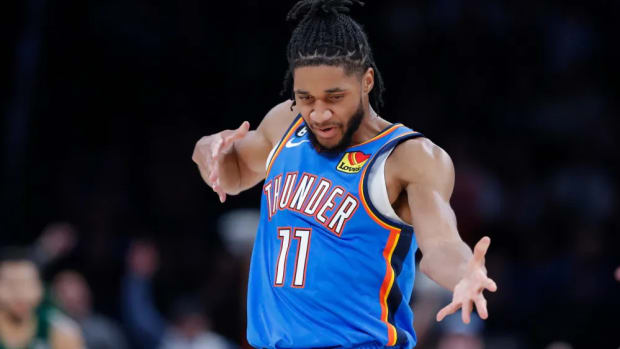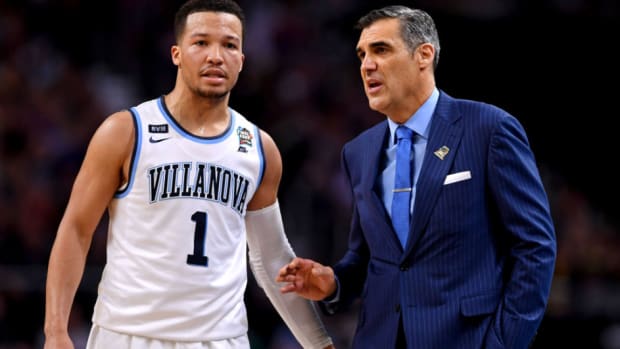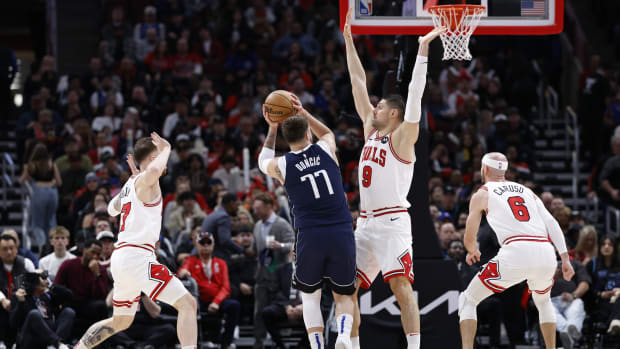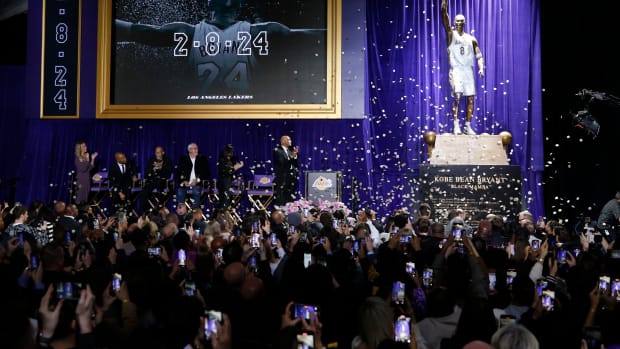The Wizards And Their Risky Otto Porter Gamble
Paying Otto Porter shouldn't a problem. He's a young wing who's solid on both ends of the floor, hits threes and helps spacing, and doesn't need a ton of touches to be effective. He's the perfect role player next to John Wall and Bradley Beal. Is it a little terrifying to give $100 million to someone who averaged 13 points per game last year? Absolutely! But that's how business is done in the NBA. All the best teams pay. The Warriors are paying Andre Iguodala and Shaun Livingston a combined $25 million next year, the Cavs have been well over the luxury tax since LeBron returned, and the Celtics will likely be footing a significant bill of their own once it's time to pay Isaiah Thomas next summer. This year it's Washington's turn.
So that part makes sense. Good teams don't lose good players for nothing, and Washington was not going to let Otto walk. He fits with the current roster, and because of his age and the league-wide thirst for two-way wings, he'll have trade value regardless. But if "Should the Wizards pay Otto Porter?" is an easy question to answer, there's a more difficult question baked into all of this, and it's currently haunting me as a Wizards fan.
Porter signed an offer sheet on a max contract with Brooklyn on Thursday, and as first reported by Adrian Wojnarowski and ESPN, the Nets offer sheet includes about eight different trap doors and trade kickers. Generally, it's full of fine print designed to make life harder on the Washington front office. This is standard operating procedure, and pending a drastic change in plans, the Wizards will match the offer sheet anyway. They've made it clear throughout the off-season that they plan to match any offer Porter gets. But that's the thing: if the Wizards knew they were going to pay Otto, why didn't they keep this simple and offer him a max deal at the outset of free agency?
The Lake Show Hits Vegas, Plus Five Other Summer League Storylines To Watch
Granted, parts of the Nets' offer sheet sound scarier than they actually are. The contract includes a 15% trade kicker and a player-option to hit free agency after three years, when Otto will have accrued enough years of service to be eligible for more money. The player option is not ideal, but it wasn't surprising. The trade kicker sounds scary, but it's mostly irrelevant through the first few years of the deal—Otto is already on a max salary, and until he's played more than seven years, the CBA prevents him from making more than 25% of the cap or 105% of his previous year's salary. In short, he's already making so much money that a 15% bump in salary is illegal under the CBA. The kicker could be an issue if he's traded in Year Four, but again, he's got a player option so it's possible he never makes it there anyway.
In any case, nothing in the Nets' offer sheet changes the calculus for Washington, including the Zach Lowe report that the Nets deal mandates that Otto be paid at least half his salary by Oct. 1. That's not a dealbreaker, but definitely a reminder that restricted free agency can get very granular and bizarre.
What's more concerning from the Wizards perspective—and the wrinkle that was inevitable regardless of how creative the Nets got—is the CBA provision that gives all restricted free agents the power to veto trades for the first year after the incumbent team matches an offer sheet.
And this is the part I'm struggling with. If any offer sheet Otto signed was going to trigger a one-year no-trade clause when the Wizards inevitably match, wasn't it worth the risk to overpay him upfront and retain the option to trade him next season?
The possibility of trading Porter was half the reason it made sense to pay him. This is a league where Victor Oladipo, Zach LaVine, and Kris Dunn just netted superstars. Otto's value would've been at least decent enough to make teams listen. What's more, paying Porter on July 1 would've given the Wizards the chance to avoid the player option inserted by the Nets—the same option that just allowed Gordon Hayward to leave Utah—and it would've made sense even if the Wizards intended to keep him. Obviously, there's no guarantee Porter would've taken the offer up front, but I'm not sure why it was never made.
It seems like the Wizards were gambling that Otto wouldn't find a max deal on the open market and that he'd eventually sign in D.C. for less than the max, allowing them to retain all the same trade options on a cheaper deal. They almost won that bet—most of the league was working without max cap space this summer, and Sacramento chose to spend its money elsewhere—but Brooklyn came through and made life complicated. And if the Nets hadn't, the Jazz probably would have. It was always going to end this way.
Now there's another gamble for the Wizards.
Given some of the other contracts the Wizards already have—[/looks at Ian Mahinmi's annual salary] [/gets vertigo]—there's probably no way they can build out a solid 10-man rotation around Wall and Beal. It's too expensive under the current cap, there are no draft picks, and everyone should be realistic about what's possible. At best they're going to have six or seven dependable players every year, and in that case, they need a third superstar to make this team into a real contender.
So: Can Otto be that guy?
Or: Can Otto be traded for that guy in the next year or two?
While everyone in D.C. asks themselves that question this weekend, there's a subplot to make everything else more stressful. John Wall was offered a massive 4 year, $170 million extension this summer, and he still hasn't signed it. That by itself isn't really reason to panic. Wall has no reason to rush into signing an extension this summer, and with two years left on his deal, the Wizards can't offer him as much guaranteed money as they might be able to next summer.
2017 NBA Free Agency: The Early Winners And Losers
If Wall makes an All-NBA team again next year, that means next July, he'd be eligible for a five-year supermax extension that would top out near $50 million in the final year. If Wall turns that deal down next summer, he'd be headed into the final year of his deal—up in 2019—looking at unrestricted free agency, having just turned down $200 million from D.C. That's when Wizards fans should start to worry/panic/cherish Game 6 memories forever.
All of that's context for what's happening with the Wizards this week. They are one of the only respectable teams left in the Eastern Conference, and Wall and Beal are budding superstars smack-dab in the middle of their primes. But it gets tricky as soon as Otto gets paid, and Wall's next contract is looming. In that case, there are two ways to look at the next few years of the Wizards.
Glass half-empty: The recent investments in the renaissance of Mike Scott and Jodie Meeks are a reminder that Wizards are working with a shell of a bench again. Otto Porter probably won't improve enough to change the bottom line. Beal and Wall will have to be perfect for the Wizards to compete against the best teams in the league, and that equation failed last year. So while the Wizards pay through the nose to retain the team that wasn't good enough, the Celtics are getting better, and the Thunder just got Paul George days after Wall publicly begged for another superstar. It's not hard to see where this is going. If the Wizards lose in the first or second round this year, Wall could balk at an extension and the Wizards could risk losing him for nothing after 2019. For that matter, if the Wizards lose in the second round, the prospect of paying escalating luxury taxes for a disappointing roster becomes its own question for ownership. This could get dark, and it could happen sooner than people realize.
Glass half-full: Everyone needs to chill. Superstars solve a lot of problems, and the window for Wall and Beal is just beginning to open. The Wizards' roster isn't as deep as the Celtics and their ceiling isn't as high, but if Wall and Beal are the foundation, there's a high floor. Signing Otto keeps them in the conversation in the top-half of their conference, and that's all any team can ask for. Look at the best teams in basketball, and once they get good it generally takes a few strokes of luck to hit another level. Sometimes that's Draymond Green's emergence and a Klay Thompson trade falling through, sometimes it's LeBron and three No. 1 picks in four years. For the Wizards, it will probably mean they find a team to take a few bad contracts, or the right star becomes available, or Otto hits another level, or... something. But the Wizards are close enough to something real to keep this roster together, and trust that winning will bring its own opportunities.
That's where the futures stands as of this weekend. Somewhere between completely doomed and genuinely hopeful. So, basically, it's like every year of Wizards basketball.
































